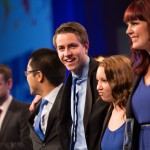A guest blog by Dustin Paisley, Enactus President at Mount Royal University

This year I got surprised with a pretty awesome birthday present – a trip to Boston to see game five of the NHL playoffs. But, what started out as a trip to see a playoff game, ended up being one of the most insightful weekends I’ve ever had – having conversations with some cool people, doing very cool things.
Four years ago, universities across North America started eliminating students’ ability to pay their tuition with a credit card. Instead of complaining or protesting like most students did, a company now known as Plastiq Inc. saw this problem as an opportunity. By providing a third party application, Plastiq allowed students to continue to pay for tuition on their credit cards and the universities could save millions in processing fees.
CEO Eliot Buchanan, a Harvard graduate, is providing this service to thousands of students across North America, but they aren’t stopping at tuition payments. Plastiq aims to allow individuals to pay anything and everything on credit card through their platform – taxes, rent, etc.
To start off the weekend, I met up with Eliot for birthday drinks (co-incidentally, we share the same birthday). Over the course of the evening, I learned all about the Boston entrepreneurship ecosystem, starting a company, raising startup capital, the difference between Canadian and US Venture Capital and the payment processing industry.
It was an incredibly insightful evening, and it kicked off what would turn out to be a week fully immersed in entrepreneurship.
Harvard Innovation Lab
Eliot was able to set me up with the assistant director of the Harvard Innovation Lab for a conversation and tour of the space; a pristine 30,000 sq. ft. space designed as an incubator for student startups.

It is used as a workstation, think tank, meeting room and general office. The space contains the essentials that a good co-working space would provide: free drinks, coffee, snacks, and of course, the newest gaming systems available – to help boost creativity, of course.
Within the space, workshops are hosted about twice a week and vary on topics from customer discovery to raising first round capital. Student entrepreneurs also have the opportunity to join an accelerator where they are given access to incredible resources such as mentors, advisors and space in the center. With over 200 student startups accessing the space, it is apparent that entrepreneurship is alive and well at Harvard University.
MIT
My next stop was MIT, where I popped into the Entrepreneurship Centre, which takes the exact approach to entrepreneurship as you would expect to see from MIT. Build it, test it, iterate and prove success or failure, but whatever you do – do it fast. The mindset at MIT is not to avoid failure, but to embrace it. In fact, failure is celebrated because it means you actually tried something, which is far better than sitting idle and being slow.
Perhaps the most intriguing part of MIT was the media lab, where truly groundbreaking research is occurring – the stuff they TED talk about. Whether it’s creating a high performance prosthetic or a trillion frame per second video that can capture the speed of light.
Babson College
Finally, I paid a visit to the most entrepreneurial school in the world: Babson College. The entire focus of this school from the day you set foot on campus is entrepreneurship – it makes up their campus culture.
Although students are encouraged to start their own ventures, the focus of Babson is on developing the entrepreneurial mindset – something I’ve experience first hand in the entrepreneurship program at Mount Royal University. The mindset taught at Babson encourages the students to ask questions, and if they don’t like the answer, create an alternative solution.
Students are trained to look at problems different and turn challenges into opportunity. Sound familiar?
Entrepreneurship is turning challenges into opportunities
 At Harvard, MIT, Babson and even MRU, they believe that entrepreneurship can be taught. However, it’s not just the universities that are teaching this – it appears Enactus students throughout Canada and all across the world are becoming accidental entrepreneurs – recognizing problems and needs within their community, and taking action to turn those challenges into opportunities.
At Harvard, MIT, Babson and even MRU, they believe that entrepreneurship can be taught. However, it’s not just the universities that are teaching this – it appears Enactus students throughout Canada and all across the world are becoming accidental entrepreneurs – recognizing problems and needs within their community, and taking action to turn those challenges into opportunities.
Chances are most people won’t graduate from Harvard, MIT, or Babson, but whether or not these Enactus students go on to start their own ventures, work for corporations or pursue whatever dream it is they are chasing, it is apparent that these students will be well equipped with the knowledge, tools, and more importantly, the mindset of being able to turn challenges into opportunities.